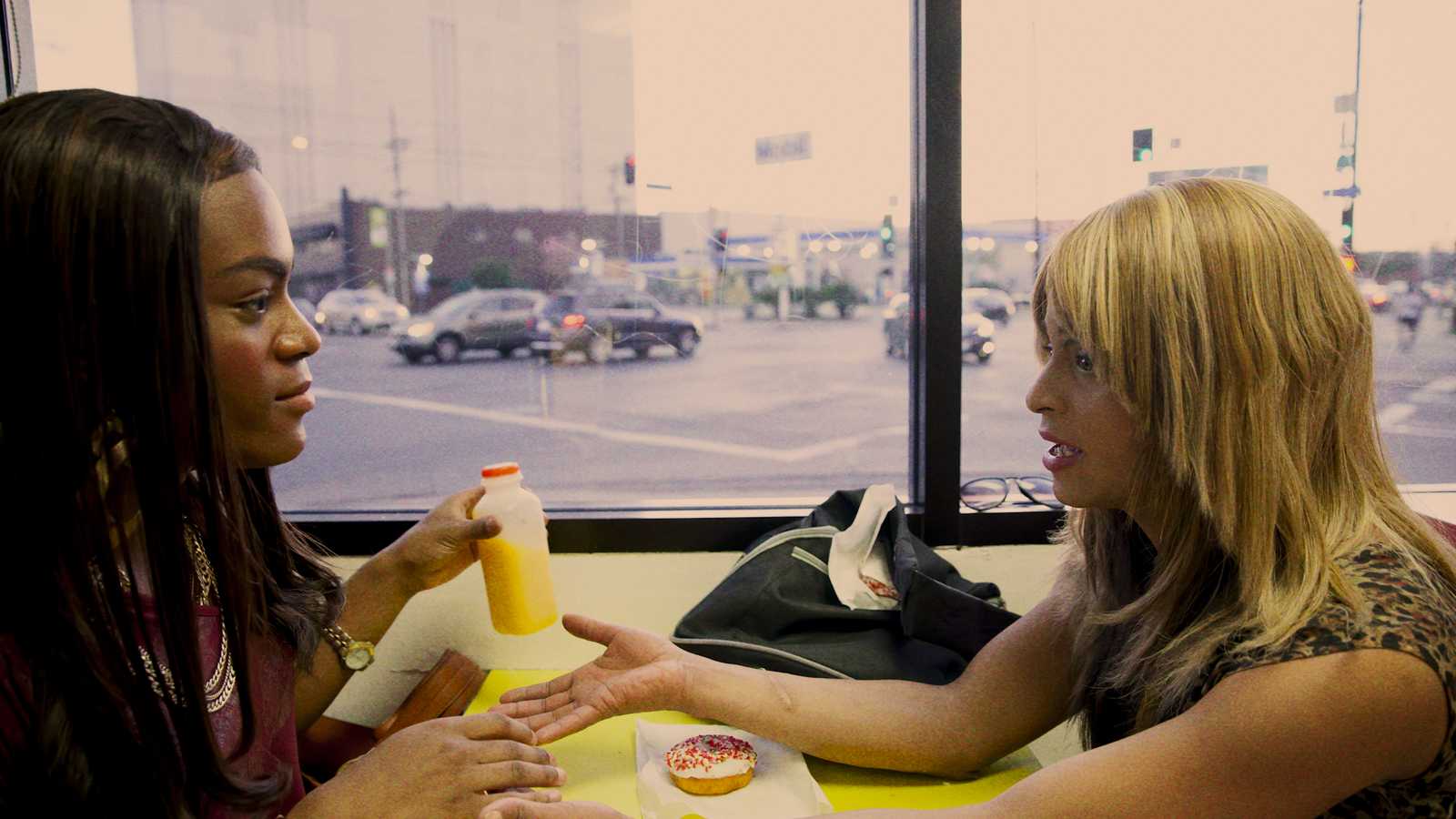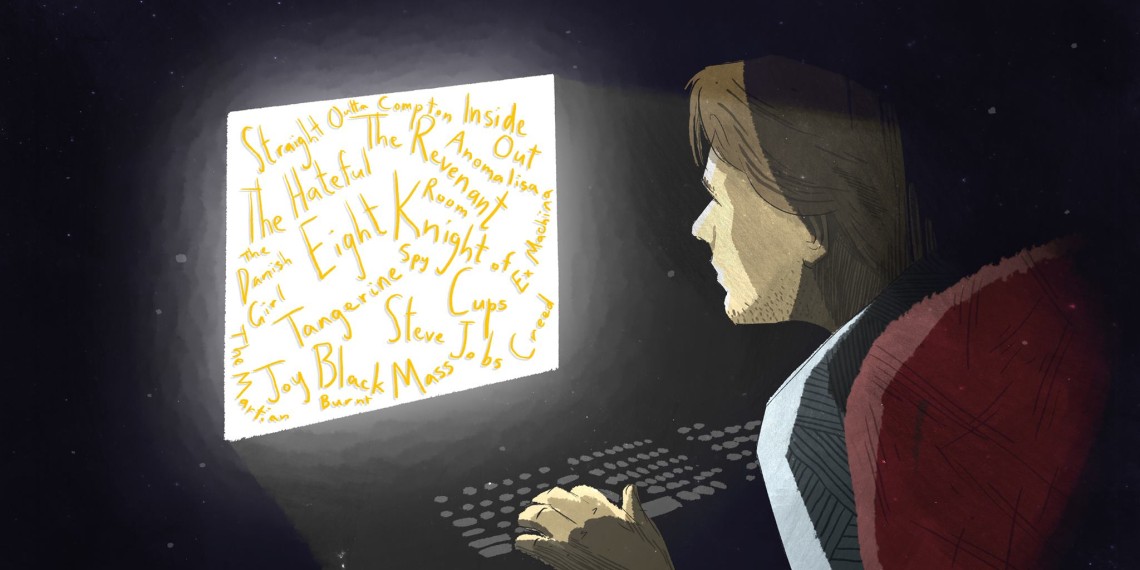On December 30, 2015, right at the tail-end of a great year of cinema, Terrence Malick’s new film, Knight of Cups, appeared for purchase on iTunes in Europe. The film, not yet released in much of the world, including America, was let loose and the damage was done. Pirates had in short order downloaded the film, stripped it of all copy protection, and put it online in multiple formats and in pristine quality. By the next day, “Film Twitter” was abuzz with news of a newly available Malick movie.
knight of cups online!!
— George (@vovin_) December 31, 2015
VAZOU O TORRENT DE KNIGHT OF CUPS, O NOVO FILME DO TERRENCE MALICK. AI MEU CORE
— Allison Linhares (@sirallison) December 31, 2015
Knight of Cups 2015 720p H264 AC3-EVO! Happy New Year y'all!
— Xavier Dolandan (@ericfloyd) December 31, 2015
Soon enough, cinephiles were tweeting their pithy reviews of Malick’s latest. For a film not set for release in the U.S. until March, showing up online so early could be a major blow to its American distributor, Broad Green Pictures. It’s a tough environment as is for independent and art-house cinema without the constant threat of piracy looming over everything. But the Knight of Cups “leak” brought to the fore an uncomfortable truth about the nature of illegal downloading: everyone does it. Not just active pirates, or average moviegoers, but serious cinephiles, critics, even industry-types. Everyone. Yet, despite its incredible ubiquity, the act of watching pirated films is usually discussed in hushed tones.
Critic Matt Zoller Seitz took to Twitter to express his shock and disapproval.
If you think that you're entitled to see every movie at the exact second that you wish to see it, without paying anything, unfollow me.
— Matt Zoller Seitz (@mattzollerseitz) January 2, 2016
In a Twitter argument that lasted hours, Seitz stood fast against what he saw as a clear violation, and one committed by fellow film buffs, no less. Seitz is not naive by any stretch. “I wouldn’t say I was surprised so much as disappointed by how openly my peers discuss films that they have clearly seen in pirated versions,” he says. This was something Seitz had seen all through the holidays, and not just with Knight of Cups, “but films like The Revenant and The Hateful Eight, which I saw many people discussing openly on Twitter days before they came out, and I know for a fact that a lot of them did not see them at press screenings.”
The leak of The Revenant and The Hateful Eight and several other Oscar contenders made headlines last month, when pirated awards-consideration screeners were traced back to a top Hollywood executive. Tarantino’s Western, “filmed in glorious Ultra Panavision 70,” was being viewed and discussed by people across the globe, including cinephiles, based on sub-DVD-quality screener rips. The urge to see the film mere days before its theatrical release was apparently overpowering for many.

Seitz points to all manner of justifications for piracy, which he graciously calls “elaborate,” but hold no water at all, “including this idea that people in New York or LA or Chicago, or critics generally are ‘really’ the entitled ones, which is a pretty playground way of defending yourself.” Perhaps more upsetting were the justifications coming from other film critics. “I also heard some of my peers saying, ‘Well, I have to torrent new releases, including ones that haven’t screened in my area, otherwise I can’t be part of the conversation!’
“Piracy has become normalized,” Seitz admits. “I am not precisely sure how or when it happened, but we’ve gotten to the point where large sectors of the public have decided that art and entertainment are things that they are entitled to have for free.”
One moderately compelling argument for downloading pirated material lies in fair use, the area of copyright law allowing for the limited transformation of a work for parody or criticism. “Some of my video essays were made by ripping DVDs that I had paid for or rented through Netflix, or torrenting things that were not available through normal channels,” Seitz explained. But he points out that many people claim fair use when it doesn’t apply at all. “Just because fair use exemptions to intellectual property law cover criticism and commentary, doesn’t mean you can illegally download a movie and morally justify it by tweeting about it.”
It’s an oft-unacknowledged fact within online media circles that the use of pirated content has become a crucial part of the click factory. Most of the GIFs from TV and film you see populating Tumblr blogs and finding their way into Buzzfeed lists and Vanity Fair articles are sourced from illegal downloads. The argument isn’t so much fair use, as pure practicality. It’s much easier, cheaper, and faster for a writer to download a TV episode illegally to screencap and make GIFs out of it, than it is to wait for it to show up on iTunes the next day, pay for it, and possibly have to strip away any copy protection (an illegal act in itself). Advanced screeners aren’t much use, either. “I use pirated TV out of necessity,” says the publisher of a successful pop-culture site, who preferred not to be named. “I suspect it’s pretty common, as critics can’t use most of our screeners for screengrabs because they’re watermarked.” This sort of under-the-radar use of pirated content isn’t usually apparent to readers, though occasionally it’s obvious, he says. “If a logo from a Canadian network is on the screengrab, it’s definitely been pirated.”
Sometimes it’s even more obvious than a stray Global TV bug in the corner. Star Wars: The Force Awakens is still in cinemas, and a few months off from its home-video release, but it doesn’t take much effort to find images and clips from scenes that were not officially released to the online public. The source? Bootlegged copies of the film, recorded illegally inside movie theaters. The quality of these clips is terrible, but that hasn’t stopped them from being shared all over the internet. Even a large online publication like The Independent used images and GIFs from bootlegged copies of The Force Awakens in an article. For an activity so self-evidently wrong, it’s incredibly pervasive. Even people who don’t themselves download torrented movies and TV shows end up sharing images and clips obtained illegally. The problem is everywhere, and touches everyone, whether it’s talked about or not.
For his part, Seitz believes that Hollywood needs to be much more attentive to consumer preferences, and suit distribution accordingly. He also agrees with many who say copyright laws should be reformed for the modern environment. “But the justifications for torrenting something without paying anything at all are bogus and always will be bogus,” he maintains.
Some downloaders of pirated films go so far as to cite protest against the Hollywood system in general as some sort of ultimate justification. Artists, they say, barely make their due, and consumers are given inadequate service at best. Piracy, many contend, is a way of doing an end-run around Hollywood’s corruption and stupidity. Seitz scoffs at this. “Theft is not a form of protest,” he counters. “That’s fake idealism, and an insult to artists. You might as well go spit in a filmmaker’s face. That’s also free.”
Filmmaker Sean Baker, director of Tangerine, which became an indie darling last year, takes a similar, if less militant, view. Of critics who downloaded and discussed Knight of Cups online, he says, simply, “that’s very disrespectful.” For Baker, and other filmmakers, piracy really is the new normal. It’s a reality which must be dealt with on the distribution side, stalling the inevitability for as long as possible through security, and hoping that the impact on profits will be minimal. Filmmakers coming up in this online world are forced to face facts, however unpleasant.
It’s not just regular consumers, or even film critics, that Baker sees watching pirated material. Those within the film industry, the people piracy hurts most, do it, too. “A lot of people [in the industry] do, and I always give them a piece of my mind,” Baker says. “But I think a lot of people do because they’re also people who don’t see many films in the theaters.” Baker himself stays away from such things, often electing to pay to see a film in theaters, even if he has a screener of the film at home. “There’s a karma thing involved for me,” he says, but that’s not always a factor for his friends in the industry. “When I ask about the karma thing, it’s usually, ‘Well, I support this industry more than anybody else, so I can do it.’”

Baker describes himself as luckier than most because his films have received solid theatrical windows, only receiving VOD and Blu-ray releases after their runs in theaters were over. This has allowed Baker to avoid the instant piracy that comes from digital releases being available for easy upload. It hasn’t stopped some people from looking to download his films illegally, though. “I’ve been doing speaking engagements about [Tangerine] at universities,” he says, “and we’d have people from universities saying, ‘We tried to torrent it, you are impossible to torrent,’ and I’m like, ‘It’s funny you’re telling me that,’ but at the same time, the fact that universities were actually trying to torrent our stuff, that’s ridiculous.”
The theatrical window hasn’t stopped debilitating leaks from happening to other indie filmmakers and distributors, though. “I remember Ti West had one of his films pirated,” Baker points out, “and that’s a major blow towards Magnolia, because they’re a tiny distributor, and they’re trying their best, but their pockets aren’t so deep.” And even Baker has found his films on torrent sites days before their Blu-ray and VOD releases, in pristine HD files, which he believes must have been leaked by someone within the release chain.
The impulse to torrent a film isn’t lost on Baker, who sees an environment with rife content and the endless desire to be up-to-date with emerging trends and to stay in the conversation. “That’s where the temptation for me comes, where it’s like, ‘I want to see this now,’ but distribution is getting better, and there are other ways of doing it. There are other ways of finding what you have to find,” he says. “I don’t just have Netflix. I have Fandor; I do a lot of imports on eBay; so I feel as if I’m covered, but I do know that some people who just can’t wait, they just simply can’t wait, [so] they resort to torrenting.”
Netflix and streaming services like it may be something of a savior, for now. In recent years, deals with services like Netflix have been crucial for independent films. Netflix pays distributors a negotiated amount for a package deal of films. This means distributors don’t have to rely on counting each viewer, and can more easily guarantee earnings on their films. Baker says that getting Tangerine on Netflix likely went a long way toward making the film profitable for Magnolia, the film’s distributor.
On top of that, the reach is enormous. According to their latest quarterly earnings statements, Netflix had over 69 million subscribers worldwide as of September 30, 2015. That is expected to grow in a big way, with Netflix recently announcing its availability in almost every country globally. This gives smaller films a huge platform to reach an audience, which is great for under-the-radar filmmakers who want to get noticed. Tangerine seems to be doing very well on Netflix, for example. “We’ve gotten so much more attention since the Netflix launch,” says Baker. “We get tweets once an hour, or a couple times an hour, from people seeing the film now, so most people are seeing it on Netflix.”
Reducing the impact of piracy isn’t easy. “It’s really just about both the industry and fans themselves becoming aware and knowing that it’s hurting everybody,” says Baker. “I mean, look where we are with music. Now we’ve had to resort to Spotify, and Spotify isn’t making these artists any money.” If the film industry is smart, and maybe just a little bit lucky, it won’t hit the same lows the music industry has.
The proliferation of digital services like Netflix has gone a long way toward making sure that doesn’t happen, but it’s no guarantee. Netflix itself is hardly immune, with many subscribers using proxies and “unblockers” to access content licensed exclusively in other regions. The practice is, at best, quasi-legal, and Netflix has announced its intention to put an end to it, while also trying to make all content available in every region. Until then, people will still find ways to circumvent Netflix’s security, and other forms of piracy may well continue to chip away at profits, inching the value consumers place on art closer and closer to zero.
—
Original illustration by Krishna Shenoi.


















3 thoughts on “We’re All Pirates”
Pingback: This Week’s Good Reads (Week of January 18) | SAGindie
This is a truly revealing article that is well researched and well-written. It is really interesting, because the “screw you, Hollywood” attitude it usually an excuse I hear too, but I have (or maybe now had) a resentful attitude towards Hollywood, but then where do you draw the line? I mean Malick is clearly an artist who is brilliant, but with Bale, Portman, Blanchett and all of these big names in his film, I guess people see that as a big Hollywood film, so they feel less bad stealing that. The fact that a line even exists is dangerous because someone can always test that line. If one big name was in Tangerine for only a minute, I’m sure that line would be tested. Really interesting article that really made me think new things on a topic that has surrounded me at college for so long. Thank you for writing.
Pingback: ‘Heneral Luna’ breaks DVD sales records, and why that’s a big deal